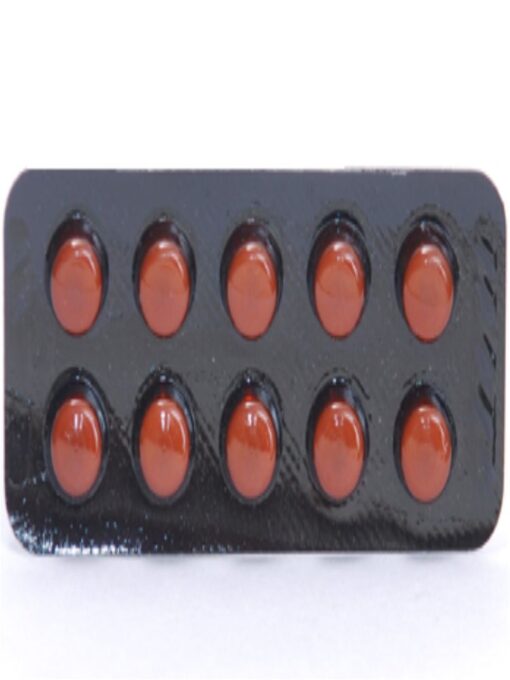Description
Uniwarfin 2 mg is a medication containing the active ingredient warfarin, which is an anticoagulant. It is primarily prescribed to prevent the formation of blood clots in conditions like deep vein thrombosis, pulmonary embolism, and atrial fibrillation. It works by inhibiting the production of vitamin K-dependent clotting factors in the liver.
Some potential side effects of Uniwarfin 2 mg include increased bleeding risk, bruising, dizziness, and headache. It is essential to follow your doctor’s instructions carefully and have regular blood tests while taking this medication to monitor its effectiveness and potential side effects.
Uniwarfin 2 mg should not be taken by patients with certain medical conditions, such as uncontrolled bleeding, severe liver or kidney disease, or a history of bleeding disorders. It is also crucial to avoid consuming foods high in vitamin K, like leafy green vegetables, while on this medication, as it may interfere with its effectiveness.
Uniwarfin 2 mg is a prescription medication, and its use should be closely monitored by a healthcare professional. If you have any questions or concerns about this medication, consult your doctor or pharmacist.
BENEFITS:
The benefits of Uniwarfin 2 mg (warfarin) primarily lie in its ability to prevent the formation of blood clots in various medical conditions. This can help reduce the risk of serious complications, such as stroke, heart attack, or death, in patients suffering from atrial fibrillation, deep vein thrombosis, or pulmonary embolism.
By inhibiting the production of vitamin K-dependent clotting factors in the liver, Uniwarfin 2 mg helps to thin the blood and reduce the likelihood of clot formation. This can be particularly beneficial for patients at high risk of developing clots due to their medical history or other factors.
Regular monitoring of blood tests while on Uniwarfin 2 mg is crucial to ensure that the medication is working effectively and to identify any potential side effects or complications. With proper management and adherence to prescribed dosages, warfarin can be a valuable tool in maintaining cardiovascular health and preventing life-threatening complications.
However, it is essential to note that the benefits of Uniwarfin 2 mg should be carefully weighed against potential risks and side effects. Patients should always consult with their healthcare provider to determine whether warfarin is the appropriate treatment for their specific condition.
SIDE EFFECTS:
Some potential side effects of Uniwarfin 2 mg (warfarin) include:
- Increased bleeding risk: Warfarin thins the blood, which can increase the risk of bleeding. This may manifest as nosebleeds, bleeding gums, or more severe bleeding, such as internal bleeding or hemorrhaging.
- Bruising: Patients on warfarin may experience easy bruising or excessive bruising from minor injuries.
- Dizziness: Some individuals may experience dizziness or lightheadedness while taking warfarin.
- Headache: Warfarin may cause headaches in some patients.
- Nausea: Some individuals may experience nausea or stomach discomfort while on warfarin.
- Rash: A small percentage of patients may develop a skin rash while taking warfarin.
- Hair loss: In rare cases, warfarin may cause hair loss.
It is essential to consult with a healthcare provider if any of these side effects become severe or if new symptoms develop while taking Uniwarfin 2 mg. Proper monitoring and management of warfarin therapy can help minimize the risk of complications and maximize the benefits of this medication.
PRECAUTIONS:
When taking Uniwarfin 2 mg (warfarin), it is crucial to follow certain precautions to minimize the risk of side effects and maximize the benefits of the medication:
- Regular blood tests: It is essential to have your blood tested regularly while on warfarin to monitor the effectiveness of the medication and make necessary adjustments to your dosage.
- Inform healthcare providers: Always inform healthcare providers, including dentists and surgeons, that you are taking warfarin, as it may affect the management of your care.
- Avoid injury: Warfarin increases the risk of bleeding, so it is essential to take precautions to avoid injuries and bleeding. This includes using a soft-bristle toothbrush, avoiding contact sports, and using an electric razor.
- Monitor alcohol intake: Alcohol can interact with warfarin and increase the risk of bleeding. It is essential to monitor alcohol intake and avoid excessive consumption.
- Inform about medications: Inform healthcare providers about any new medications, including over-the-counter drugs and supplements, as they may interact with warfarin and affect its effectiveness or safety.
- Avoid certain foods: Some foods, such as leafy green vegetables, can affect the effectiveness of warfarin. It is essential to maintain a consistent diet and avoid significant changes in the intake of vitamin K-rich foods.
- Protect from sun: Warfarin may increase the risk of sunburn. It is essential to protect your skin from the sun and use sunscreen when outdoors.
Always consult with a healthcare provider for personalized guidance on taking Uniwarfin 2 mg and managing potential side effects and precautions.





28 reviews for Uniwarfin 2 mg (Warfarin)